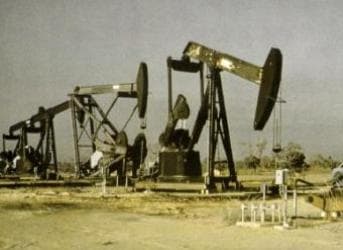Venezuela said it was ready to welcome a Russian energy company into the giant Orinoco oil belt, solidifying a relationship propped up by a multi-million investment from Moscow last year. Both sides announced recently they'd starting working through a Caracas-controlled joint venture in a 21,000-square-mile section of the vast oil reserve. When the Iranian president paid a visit to the region, House Republicans cried foul over the "tour of tyrants" though Russia's relationship with Caracas barely makes headlines. While Moscow is certainly no Tehran, it's certainly no beacon of democracy either. With Caracas sitting atop OPEC in terms of reserves, lawmakers should put aside their grievances in favor of a grand assessment of U.S. energy security.
Caracas in 2007 said international oil companies working in the Orinoco belt need to be minority partners to work there. The region holds more than 500 billion barrels of technically recoverable reserves, making it host to one of the largest known oil deposits in the world. Caracas approved of a joint venture between state-run oil company Petroleos de Venezuela, or PDVSA, and a regional subsidiary of Russia's Gazprom, which would hold a minority stake with 40 percent. Last year, Moscow paid around half of the $1 billion needed to help develop oil in Venezuela.
Caracas said recently there's no way it would privatize PDVSA, which makes it a natural partner for a company like Gazprom, which also likes to gobble up other companies. U.S. supermajor Exxon Mobil is locked in a court battle with Caracas over the terms of the 2007 decision on joint ventures, though the joint venture requirement did little to discourage Russian energy companies from tapping into Venezuela's vast oil reserves. And why should it? Caracas tops the OPEC ranks and agreeing to their terms simply makes good business sense.
When Iranian President Mahmoud Ahmadinejad toured Latin America last month, he said his Western adversaries should no longer consider the region their "back yard." Before he arrived, Rep. Ileana Ros-Lehtinen, R-Fla., chairwoman of the U.S. House Foreign Affairs Committee, said Ahmadinejad's visit was a "tour of tyrants," a tour that included talks with the likes of Venezuela's Hugo Chavez and the Castro brothers in Cuba. So why are there no complaints about Moscow's ambitions in the "back yard" of the United States?
Political issues with regional visits by U.S. adversaries shouldn't interfere in broader issues over energy. It's duplicitous for lawmakers like Ros-Lehtinen to complain when Tehran courts U.S. adversaries in Latin America but remain silent when entities from another government do the same. Russian energy companies, no matter how you cut it, are taking a significant stake in the some of the largest oil reserves in the world. If U.S. energy security is truly an international issue, than policy decisions should be based on pragmatism not grievances against a particular government.
By. Daniel J. Graeber of Oilprice.com


















The oil under discussion is probably HEAVY OIL, and I really and truly dont believe that if it is heavy oil, the Russian oil people/experts will be able to do something that American oil people/experts were unable to do.
Russia's relationship with Caracas is hardly worth mentioning except in conversations where the other principal topic is Brad Pitt, and as for Russia not being a "beacon of democracy", I say better Putin or Medvedev than George W. Bush.